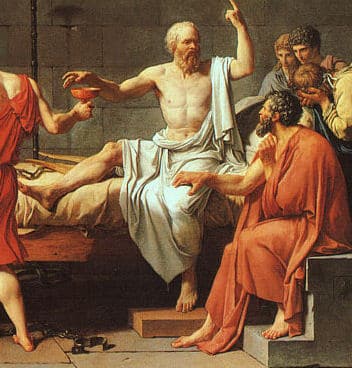Quotes on Socrates by Prof. Dr. Wolfgang Deppert and others
 .
. ..Socrates Daimonion (One possible explanation)
..Socrates Daimonion (One possible explanation) >
Socrates Daimon (Voice of the Higher Presence)
- Socrates estimated his daimon very high and could hear what it has to say. This attitude cost Socrates his earthly life. It is an irony of history that it is exactly that which makes him, even after his biological demise, "immortal" among Western philosophers.
"This year (Socrates Year 2002) it could be highlighted by increased research on the historical Socrates that Socrates was the first, who thought conceptually and who applied the theoretical and conceptual thinking to practical problem solving." ~
Prof. Dr. Wolfgang Deppert
"Religion means initially to attribute the acts of one’s own to a carrying framework of sense. And religiousness is one’s capability to follow an already existing framework of sense or to acquire it by one’s own efforts. We may therefore distinguish between a religious ‘steerage from outside’ and a religious ‘steerage from within’. The person of the former type is convinced to be too imperfect oneself to organize one’s life self-responsibly. For that reason it seeks an authority to tell it how to live a meaningful life.
Humans guided religiously from outside follow an authoritative conduct of life. They need religious freedom only then, when there exist competing authoritarian religious systems so that they may freely decide to which authoritarian religious ‘sense system’ they wish to subordinate themselves. – Humans guided religiously from within, however, are much more dependent on religious freedom, as they are not willing to believe anything which contradicts their own convictions. They claim to live their lives in their individual way and, by that, they are responsible before themselves for what they do and what they do not do. Their conduct of life must be described, therefore, as a self-responsible one."
"The history of thought of the situation at the times of Socrates was very similar to that one in the world of ours. During his time people were losing, to a great extent, their tie with the polytheistic, mythical realm of the gods, and today vast numbers of people are losing their faith in the monotheistic confessions. Then and today an increasing need for orientation prevailed. Although Socrates had demonstrated, by his example to steer one’s life by thinking, the developing of a safe system of ‘steerage from within’, it was notably his follower Plato who ensured the clear supremacy of the authoritarian sense system of the ‘steerage from outside’ in Graeco-Roman times. Christianity and the Islamic world could become established on this philosophical basis and could essentially determine the Middle Ages up to the European modern times. Today, these authoritarian systems of orientation have been losing their persuasive power considerably. Therefore it is of quite particular interest to learn how Socrates was developing and was living his religiousness."
"What do we know about the historical Socrates’ life and his way of thinking? As has been proved, he drank, by reason of a death sentence, a cup of lethal poison, although he would have been able to flee. How self-assured and confidently a man must have lived his life, if he is prepared – in full possession of his mental and physical strength – to stand up with his own death for his way to live! What a kind of life was it which has made Socrates so admirable and how well-grounded was it."
"There is nothing but a few written documents about the historical Socrates.
He himself has left nothing in writing. Since for him everything was a matter of a conscious life here and now. Most of his many followers, however, produced scripts on their mentor Socrates. Indeed, Socrates' inner existence survived his physical death 2400 years ago (in 2002), notwithstanding the objections, until today; because it grows living in everybody who is in quest of the historical Socrates in the scripts of Xenophon and in the early scripts of Plato. What is good' must, for the historic Socrates, always be related to the victory over a problematic situation. Without any reference, for Socrates, there exists nothing good.
"With our terms of today we say: Socrates was a relativist, since, for him, there are no meanings for words which exist for themselves. But how can a relativist give rise to certainty in his thinking? Because he can not be grounded, after all, on any absolute certainty (which is provided only for those who can believe in an absolute divine authority), can he? This is the vital religious question which is as relevant today as it must have been for Socrates at his time. To this very deepest quest for the religious substantiating I should like to quote Antistehenes again, who, according to Diogenes Laertius’ witness, is supposed to have said about the Socratic philosophy the following: “The question which benefit philosophy had caused him, he answered: The mental power to
communicate with myself.”
"As late as in the middle of the third century (Christian era) the wealth of the ancient sources was accessible to the author Diogenes Laertius, when he wrote down, in the year about 230, his work “Biographies and Opinions of Famous Philosophers”. From him we learn ( II 20 ) that Socrates was said to be the first to speak of principles of life. In addition to him we possess, today, notably in the scripts of the two Socrates followers Xenophon and Plato, reports on the life and work of their mentor. The idea of Socrates’ life principles as delineated by Plato, in a wilful way, is almost contrary to the idea portrayed by Xenophon. Initially the Socrates view of Xenophon was acknowledged as the authentic one, as the reputation of an objective observer was hurrying ahead of the historiographer Xenophon. During the longest period of the past Socrates interpretations, however, Plato’s version was taken seriously and that of Xenophon was rejected. Today, as it appears to have become clear why Plato’s version is so controversial to that one of Xenophon, we have to proceed from the assumption that the historical Socrates was described in the more authentic way by Xenophon."
"We have to proceed from the fact that in the mythical age people did not reflect upon the question for the meaning of life, because they were embedded into a world still completely determined by gods and goddesses. Only with the decay of the myth which goes along with the development of becoming conscious of one’s individuality, man is faced with the question of how to lead a life meaningfully. Socrates was, to our knowledge, the first person to perfect himself in a self-responsible conduct of life."
» How to Learn from Socrates to Orient Oneself
___
"In Plato's Apology of Socrates, Socrates claimed to have a daimonion (literally, a "divine something") that frequently warned him - in the form of a "voice" - against mistakes but never told him what to do. Socrates was accused of denying the gods recognized by the state and introducing instead of them strange divinities and of corrupting the young. The first of these charges rested upon the notorious fact that he supposed himself to be guided by a divine visitant or sign. The second, Xenophon tells us, was supported by a series of particular allegations: that he taught his associates to despise the institutions of the state, and especially election by lot; that he had numbered amongst his associates Critias and Alcibiades, the most dangerous of the representatives of the oligarchical and democratical parties respectively; that be taught the young to disobey parents and guardians and to prefer his own authority to theirs; that he was in the habit of quoting mischievous passages of Homer and Hesiod to the prejudice of morality and democracy."
» The Accusations Against Socrates
"Socrates (in Plato’s dialogue, Apology), explains at his trial his career as a gadfly around the city, including the source of his judgment (prudence) in the daimonion (voice of a daimon) that spoke to him."
Socrates: “It may seem curious that I should go round giving advice like this and busying myself in people’s private affairs, and yet never venture publicly to address you as a whole and advise on matters of state. The reason for this is what you have often heard me say before on many other occasions–that I am subject to a divine or supernatural experience which Meletus saw fit to travesty in his indictment. It began in my early childhood–a sort of voice which comes to me, and when it comes it always dissuades me from what I am proposing to do, and never urges me on. It is this that debars me from entering public life.” >
Daimonion (Socratic Relay)


